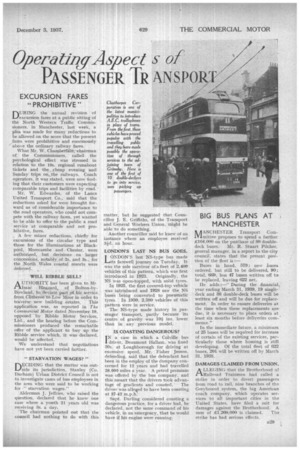Operatin c y Aspect s of PASSENGER TR ANSPORT
Page 27

If you've noticed an error in this article please click here to report it so we can fix it.
EXCURSION FARES " PROHIBITIVE "
DURING the annual revision of .excursion fares at a public sitting of the North Western Traffic Commissioners, in Manchester, last week, a plea was made for many reductions to be allowed on the score that the present fares were prohibitive and enormously above the ordinary railway fares.
What Mr. W. Chamberlain-,--ehairrnan of the Commissioners, called the psychological effect was stressed in relation to the 10s. regional runabout tickets and the., cheap evening and Sunday trips on,,the railways. Coach operators, it was stated, were now finding that their customers were expecting comparable trips and facilities by road. '
Mr: W. .Edwardes, of the Lanes United Transport Co., said that the reductions asked for were brought forward as of considerable importance to the road operators, who could not compete with the railway fares, yet wanted to be able to offer to the public a road service at comparable and not prohibitive, fares.
A few minor reductions, chiefly for excursions of the circular type and those for the illuminations at Blackpool, Morecambe and Chester, were
authorized, . but decisionslarger concegsionS; notably:of -2s. and 3s., for the North Wales coastal resorts were deferred.
WILL RIBBLE SELL?
A UTHORITY has been given to Mr. tilsa.ac lileazard, of Bolton-byBow land to deviate part of his service from Clitheme to Low Moor in order to traverse new building 'estates. This application was, as reported in The Commervial Motor dated November 19, opposed ..by Ribble Motor Services, Ltd., and the hearing before the Commissioners produced the remarkable offer of the applicant to buy up the Ribble service which, it was declared, would be affected.
We understand that negotiations have not yet been carried farther.
" STARVATION WAGES?"
DECIDING that the matter was outside its jurisdiction, Stanley (Co. Durham) Urban District Council is not to investigate cases of bus employees in the area who were said to be working
for " starvation wages."
Alderman J. Jeffries, who raised the question, declared that he knew one case where a youth 21 years old was receiving 3s. a day.
The chairman pointed out that the council had nothing to do with this matter, but he suggested that Councillor J. E. Griffiths, of the Transport and General Workers .Union, Might be able to do something.
Another councillor said he knew of an instance where an employee received 31d. an hour.
LONDON'S LAST NS BUS GOES.
LONDON'S last NS-type bus made Laits farewell journey on Tuesday. It was the sole survivor of a fleet of 2,40Ef vehicles of this pattern, which was first
introduced in 1923. Originally, the NS was open-topped, with solid tyres.
In 1925, the first covered-top vehicle was introduced and 1928 saw the NS buses being converted to pneumatic tyres. In 1930, 2,380 vehicles of this pattern were in service.
The NS-type made history in passenger transport, partly because 'its centre of gravity was 104 ins, lower than in any previous model.
IS COASTING DANGEROUS?
1N a case in which a Colville bus
driver, Beaumont Hallam, was fined 30s. at Loughborough for driving at excessive speed, Mr. Fisher Jesson, defending, said that the defendant had been in the employ of the bmpany concerned for 12 years and had travelled 26,000 miles a year. A petrol premium was offered by the bus company, and this meant that the drivers took advantage of gradients and coasted,' The driver was alletied to have been coasting at 37-42 m.p.h.
Supt. Darling considered coasting, a dangerous practice, for a driver had, he declared, not the same command of his vehicle, in an -emergency, that he would have if his engine were running.
BIG BUS PLANS AT MANCHESTER
1IiTA'NCHESTER Transport Com1.V.Irnittee proposes to spend a further £164,000 on the purebase of 80 double
deck buses, Mr. R. Stuart PiIcher, general manager, in a report to the city council, states that the present position of the fleet is : Buses in hand, 579; new buses ordered, but still to be delivered, 90: total, 669, less 47 buses written off to be replaced, leaving 622 net.
He adds During the financial, Year ending March 31, 1939, 19 single• deck and 36 double-deck buses will be written off and will be due for replacement. In order to ensure deliveries at the time when these replacements are due, it is necessary to place orders at least six months before deliveries cornmence."
In the immediate future, a minimum of 25 buses will be required for increase of certain of the existing services, particularly those where housing is still developing. Of the total fleet of 622 • buses, 201 will be written off by March 31, 1938.
DAMAGES CLAIMED FROM UNION.
ALLEGING that the Brotherhood of Railroad Trainmen had called a strike in order to divert passengers from road to rail, nine branches of the Greyhound system, the big American coach company, which operates services to all important cities in the United States, have filed a suit for damages against the Brotherhood. A
sum of £1,260,000 is claimed. The strike has bad, serious effects.


































